外研版(2019)必修第一册Unit 4 Friends foreve Using language课件(共41张PPT,内镶嵌音频)
文档属性
| 名称 | 外研版(2019)必修第一册Unit 4 Friends foreve Using language课件(共41张PPT,内镶嵌音频) | 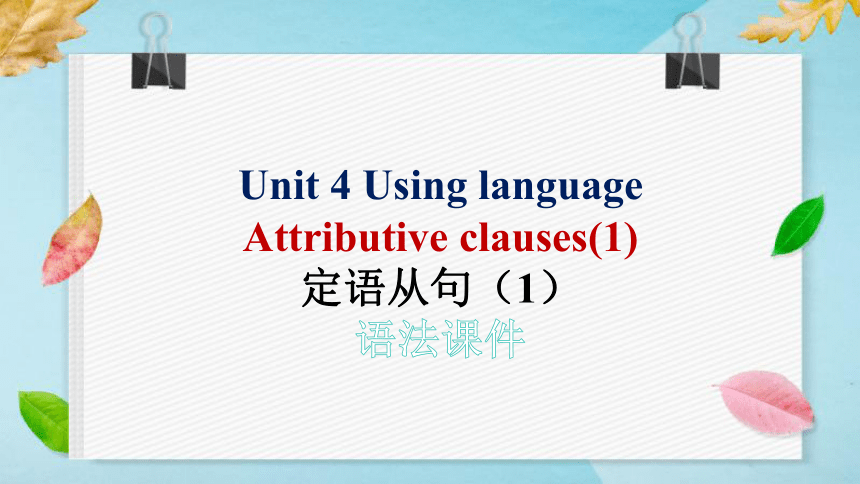 | |
| 格式 | pptx | ||
| 文件大小 | 10.0MB | ||
| 资源类型 | 教案 | ||
| 版本资源 | 外研版(2019) | ||
| 科目 | 英语 | ||
| 更新时间 | 2024-10-10 16:51:25 | ||
图片预览

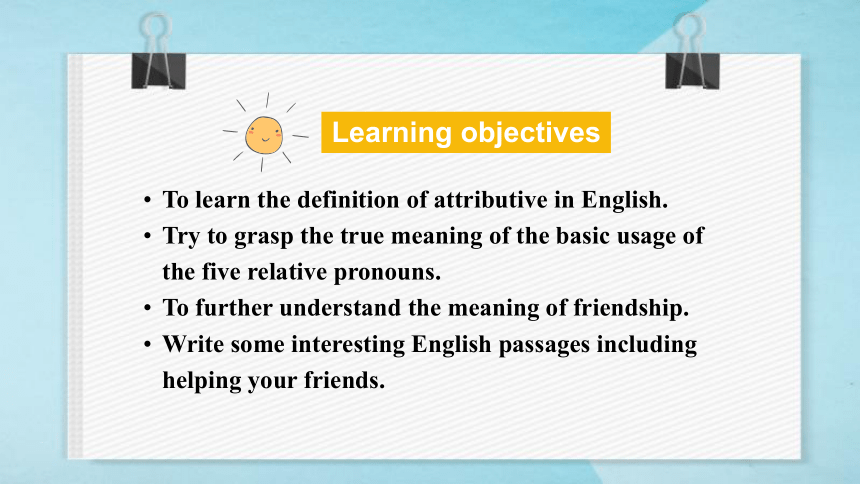
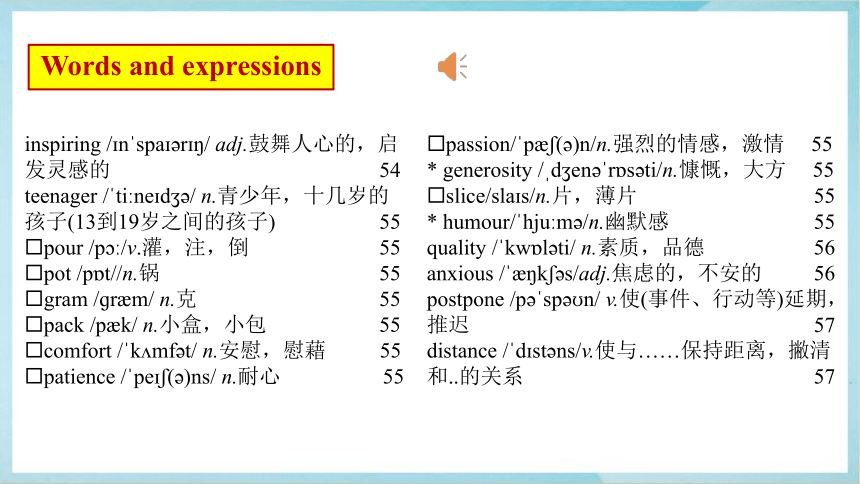
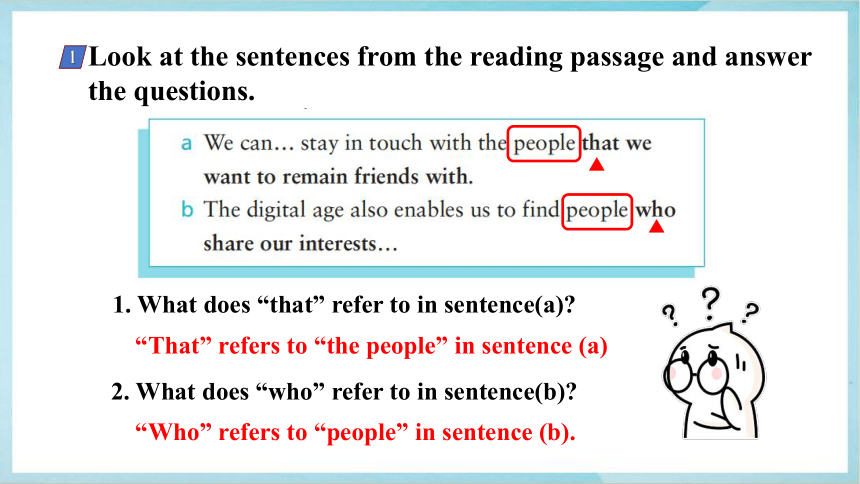
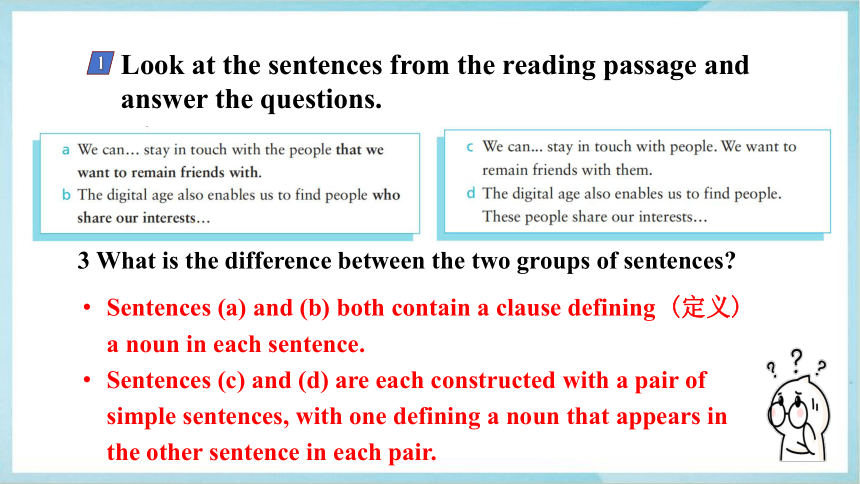

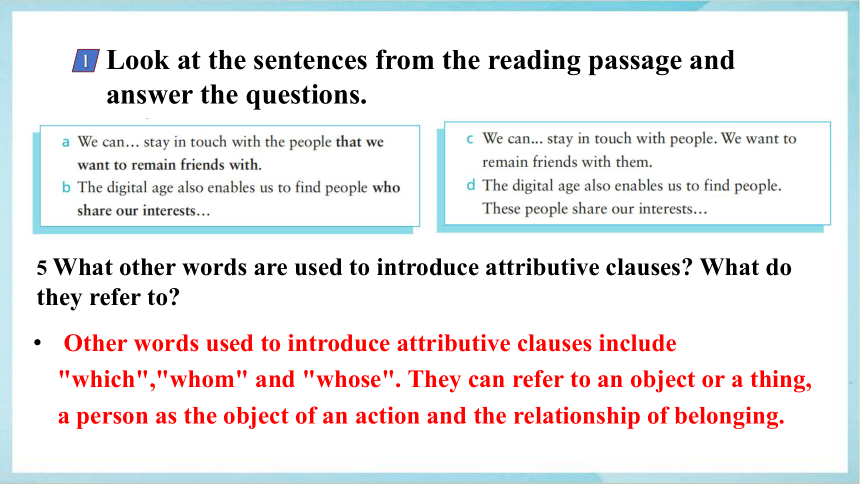
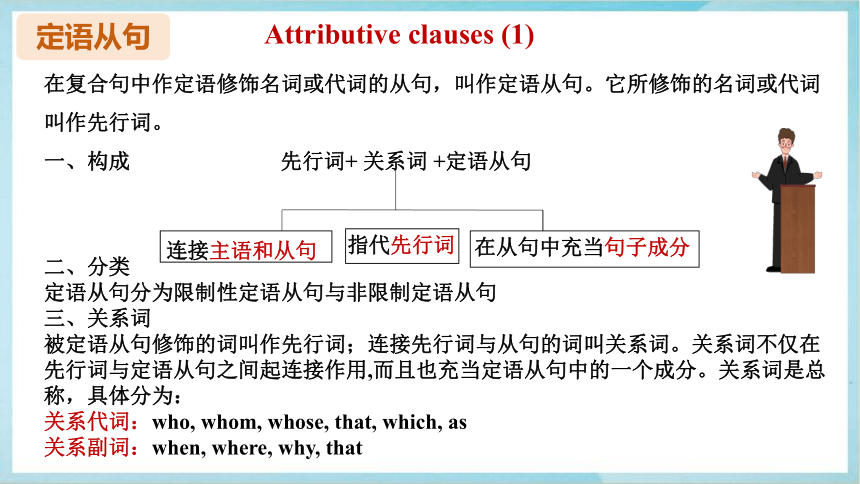

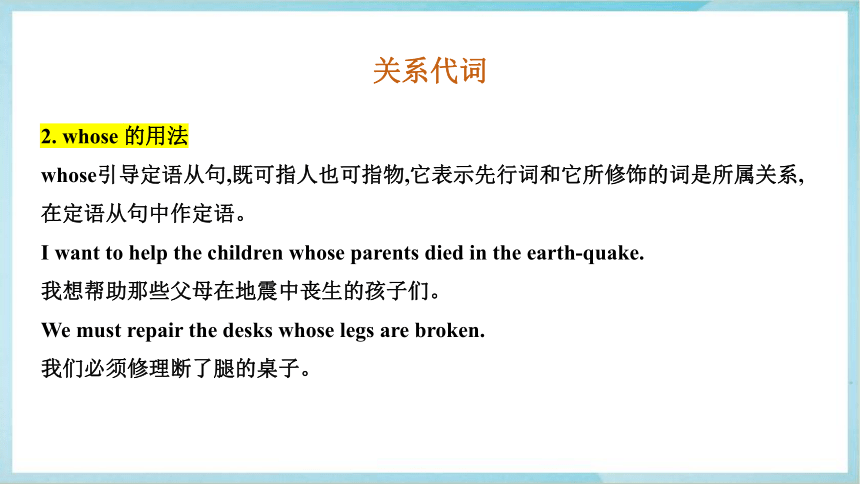
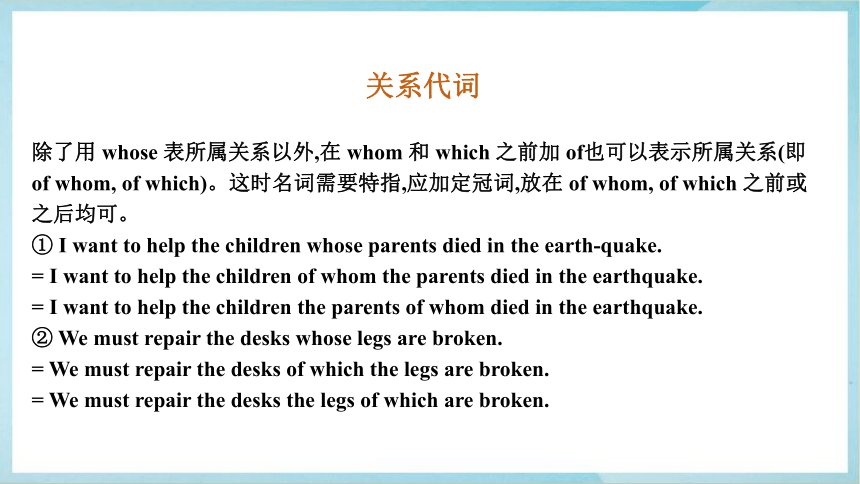
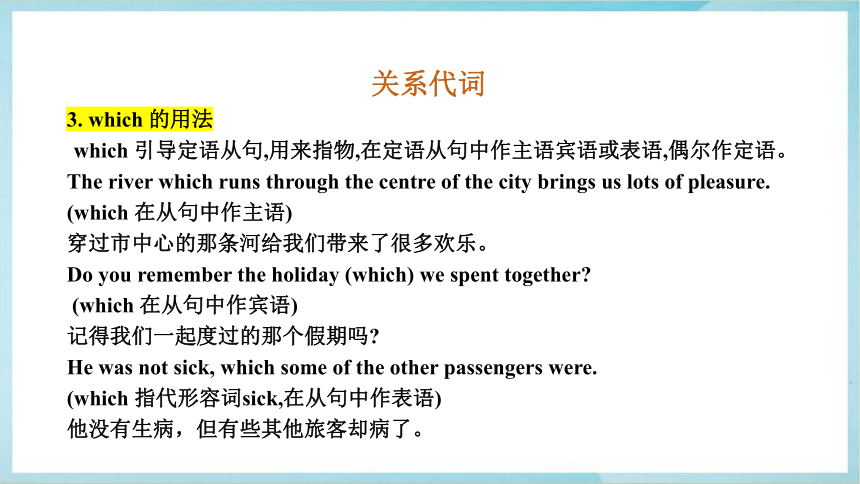
文档简介
(共41张PPT)
Unit 4 Using language
Attributive clauses(1)
定语从句(1)
语法课件
To learn the definition of attributive in English.
Try to grasp the true meaning of the basic usage of the five relative pronouns.
To further understand the meaning of friendship.
Write some interesting English passages including helping your friends.
Learning objectives
inspiring / n spa r / adj.鼓舞人心的,启发灵感的 54
teenager / ti ne d / n.青少年,十几岁的孩子(13到19岁之间的孩子) 55
pour /p /v.灌,注,倒 55
pot /p t//n.锅 55
gram /ɡr m/ n.克 55
pack /p k/ n.小盒,小包 55
comfort / k mf t/ n.安慰,慰藉 55
patience / pe ( )ns/ n.耐心 55
Words and expressions
passion/ p ( )n/n.强烈的情感,激情 55
* generosity / d en r s ti/n.慷慨,大方 55
slice/sla s/n.片,薄片 55
* humour/ hju m /n.幽默感 55
quality / kw l ti/ n.素质,品德 56
anxious / k s/adj.焦虑的,不安的 56
postpone /p sp n/ v.使(事件、行动等)延期,推迟 57
distance / d st ns/v.使与……保持距离,撇清和..的关系 57
1. What does “that” refer to in sentence(a)
2. What does “who” refer to in sentence(b)
Look at the sentences from the reading passage and answer the questions.
“That” refers to “the people” in sentence (a)
“Who” refers to “people” in sentence (b).
1
3 What is the difference between the two groups of sentences
Look at the sentences from the reading passage and answer the questions.
Sentences (a) and (b) both contain a clause defining (定义) a noun in each sentence.
Sentences (c) and (d) are each constructed with a pair of simple sentences, with one defining a noun that appears in the other sentence in each pair.
1
4 Why does the author choose to use sentences (a) and (b) in the reading passage
Because there is a closer link and connection between “people” and the clause defining it in sentences (a) and (b). It also makes the passage clearer, and creates an emphatic(强调的) effect on the people or things being defined.
1
Look at the sentences from the reading passage and answer the questions.
5 What other words are used to introduce attributive clauses What do they refer to
Other words used to introduce attributive clauses include "which","whom" and "whose". They can refer to an object or a thing, a person as the object of an action and the relationship of belonging.
1
Look at the sentences from the reading passage and answer the questions.
Attributive clauses (1)
定语从句
在复合句中作定语修饰名词或代词的从句,叫作定语从句。它所修饰的名词或代词叫作先行词。
一、构成 先行词+ 关系词 +定语从句
二、分类
定语从句分为限制性定语从句与非限制定语从句
三、关系词
被定语从句修饰的词叫作先行词;连接先行词与从句的词叫关系词。关系词不仅在先行词与定语从句之间起连接作用,而且也充当定语从句中的一个成分。关系词是总称,具体分为:
关系代词:who, whom, whose, that, which, as
关系副词:when, where, why, that
连接主语和从句
指代先行词
在从句中充当句子成分
关系代词
关系代词除了指代主句中的先行词外,同时还在定语从句中作主语、宾语、表语等。作宾语时可以省略;但关系代词作介词宾语,而且介词提到它的前面时,关系代词不能省略。
1. who, whom 的用法
who和 whom 引导定语从句,二者都用于指人。who在定语从句中作主语或宾语,whom 在定语从句中只作宾语。在现代英语中,跟特殊疑问句一样,作宾语时可以用who代替whom。
The boy who made a speech just now is my best friend.
(who在从句中作主语)
刚才发表演讲的那个男孩是我最好的朋友。
I have many friends (who/whom) I can turn to for help when in trouble. (who/whom在从句中作宾语)
我有很多在困难时刻可以求助的朋友。
关系代词
2. whose 的用法
whose引导定语从句,既可指人也可指物,它表示先行词和它所修饰的词是所属关系,在定语从句中作定语。
I want to help the children whose parents died in the earth-quake.
我想帮助那些父母在地震中丧生的孩子们。
We must repair the desks whose legs are broken.
我们必须修理断了腿的桌子。
关系代词
除了用 whose 表所属关系以外,在 whom 和 which 之前加 of也可以表示所属关系(即of whom, of which)。这时名词需要特指,应加定冠词,放在 of whom, of which 之前或之后均可。
① I want to help the children whose parents died in the earth-quake.
= I want to help the children of whom the parents died in the earthquake.
= I want to help the children the parents of whom died in the earthquake.
② We must repair the desks whose legs are broken.
= We must repair the desks of which the legs are broken.
= We must repair the desks the legs of which are broken.
关系代词
3. which 的用法
which 引导定语从句,用来指物,在定语从句中作主语宾语或表语,偶尔作定语。
The river which runs through the centre of the city brings us lots of pleasure.
(which 在从句中作主语)
穿过市中心的那条河给我们带来了很多欢乐。
Do you remember the holiday (which) we spent together
(which 在从句中作宾语)
记得我们一起度过的那个假期吗
He was not sick, which some of the other passengers were.
(which 指代形容词sick,在从句中作表语)
他没有生病,但有些其他旅客却病了。
关系代词
4. that的用法
that引导定语从句,既可指人也可指物,指人时可与who或whom互换,指物时可与 which 互换。在从句中可作主语、宾语、表语。作宾语时可以省略;作介词的宾语时介词不能提到 that 之前。
Jane is no longer the person (that/who/whom) I worked with several years ago.
(that, who, whom 在从句中作宾语)
珍妮不再是几年前我与之共事的那个人了。
This is the supermarket that/which sells a variety of goods.
(that, which 在从句中作主语)
这就是那个卖各种各样的商品的超市。
关系代词
5. as的用法
as引导定语从句主要用于两种情况:一种是限制性定语从句,先行词由 as,so,such,the same 修饰;一种是非限制性定语从句,其先行词是整个主句,即as 指代整个主句的内容。
(1)as引导限制性定语从句,先行词前有 as, so, such, the, same修饰。
当先行词前有as, so, such, the same 等修饰时,关系代词常用 as,它在从句中作主语或宾语。
Such people as have made great contributions to the world should be greatly respected.
那些对世界做出巨大贡献的人应受到极大的尊重。(as 作从句的主语)
You may take as many chairs as you need.
我父母没有我想要的那么多钱。(as 作 need 的宾语)
He made the same mistake as you made in the last exam.
在上次考试中,他犯了跟你相同的一个错误。(as作made的宾语)
关系代词
(2)as 引导非限制性定语从句,其先行词是整个主句。
as 也可以引导非限制性定语从句,先行词就是整个主句,它在定语从句中作主语、宾语。它引导的从句可以位于主句前,也可以位于主句后,还可以位于主句中间。
As everybody knows, Shakespeare was a great English writer.
(从句在主句之前,as 作从句的宾语)
众所周知,莎士比亚是一位伟大的英国作家。
Tom is a brave boy, as is described in the report.
(从句在主句之后,as 作从句的主语)
汤姆是一个勇敢的男孩,这正如在报道中描述的那样。
The project, as we had expected, got along well.
(从句在主句中间as 作从句的宾语)
正如我们所预料的那样,工程进展顺利。
as 引导非限制性定语从句时,常见表达
as we all know众所周知 as I can remember 正如我所记得的
as often happens这经常发生 as we expect 正如我们预料的那样
as you see 这一点你明白 as has been said before 如前所述
as is well known 众所周知 as was expected 正如预料的那样
as can be seen 看得出来 as may be imagined正如可以想象出来的那样
as has been said above 如上所述 as we all can see 正如我们都能看到的那样
关系代词的省略
(1)关系代词在从句中作宾语时可省略。
The watch (that/which) you gave me keeps perfect time.
你给我的那块表走得很准。
(2)关系代词在从句中作表语时可省略。
My hometown is no longer the one (that) it used to be.
我的家乡不再是过去的那个样子。
(3)关系代词在从句中作介词的宾语,而介词在从句句尾时关系代词可省略。
The people (who/whom/that) I spoke to were very helpful.
我与之交谈过的人都非常乐于助人。
用that 不用 which 的情况
(1)当先行词是all, little, few, much, every-thing, nothing, none等不定代词时。
Our parents always do everything that they can to support us.
我们的父母总是尽他们的所能来支持我们。
(2)当先行词被 all, every, no, little, few, much, the only, the very, the right, the last 等修饰时。
These messages are the very ones that I have been looking for.
这些就是我一直在寻找的信息。
(3)当先行词是序数词、形容词最高级或被序数词、形容词最高级修饰时。
This is the first time that I have been here.
这是我第一次来到这儿。
(4)当主句是以which开头的特殊疑问句时。
Which is the book that you like best
你最喜欢哪本书
用 who 不用 that 的情况
(1)当先行词为人称代词 he, she, they 或 one(s), anyone, nobody 等指人的不定代词时。
He who plays a trick must be prepared to take a joke.
玩花招的人必定会受到戏弄。
(2)当指人的先行词是those,或先行词被 those 所修饰时。
Those who work hard will get more chances.
工作努力的人会有更多机会。
(3)当指人的先行词是序数词或被序数词修饰时。
They were the first who arrived there.
他们是去那里的第一批人。
(4)当指人的先行词和定语从句被其他成分分隔时。
The person is downstairs who you have been looking for since last year.
自去年以来你一直在找的那个人就在楼下。
(5)当指人的先行词由两个定语从句修饰(即双重定语从句时,第二个定语从句只能用who/whom引导,不能用that。第二个定语从句的关系代词不可省略。
She is the only girl I know who can play the guitar.
她是我所认识的唯一会弹吉他的女孩。
(6)there be结构中先行词指人时。
There is a beautiful girl who wants to see you.
有位要见你的漂亮女孩。
用 that 不用 who 的情况
(1)在特殊疑问句中,如果开头的疑问代词是who,为了避免重复,定语从句宜使用 that引导,而不用 who。
Who is the person that is standing at the gate
站在门口的那个人是谁
(2)当先行词为疑问代词 who, which 时
Who that knows his misfortunes can help feeling an interest in him
凡是了解他的不幸的人,谁能不关心他呢
(3)当关系代词在定语从句中作表语或宾语补足语时,定语从句也不用 who引导,而用that,或者省略关系代词that。这一般是确认性表语。
He is no longer the man that he was. (that 指代先行词the man,在定语从句中作表语)
他已经不是过去的他了。
(4)当先行词同时包含人和物时。
She took photographs of the people and things that she was interested in.
她把她所感兴趣的人和物全部拍摄了下来。
关系代词的基本用法
that
指人
指物
主语
宾语
主语
宾语
whose
who
whom
which
指人的或物的
Summary
Fill in the blanks with the correct forms.
1. They are building a hospital near the street ______ we used to live.
2. The present ______________ he gave her yesterday evening is still unopened.
3. Happiness is one of the things ___________ money cannot buy.
4. I'll never forget the day ______ I joined the League in my middle school.
5. The man ______ wife died last year has gone to Japan.
where
which/that
which/that
when
whose
Exercise
Fill in the blanks with the correct forms.
6. Tell me the reason ______ the American lady left in a hurry.
7. Do you know the boy ______ was praised at the meeting
8. Allen is the girl ________ I think will succeed in the speaking contest.
9. The manager walked toward the gate ______ the workers were waiting.
10. Her parents wouldn't let him marry anyone ______ family was poor.
why
who
who/that
where
whose
Rewrite the underlined sentences with that, which, who, whom or whose.
5. Lucy is a good listener (whom/who/that) I enjoy sharing moments of my life with.
4. I sometimes have problems (that/which) I can’t solve.
1. Lucy is my friend who/that has a hearing problem.
2. So I learnt a new language which/that allows me to “speak” with my hands.
3. Lucy is a smart girl whose ideas are always inspiring.
2
Complete the online forum post with that, which, who, whom or whose.
that/which
whose
who/that
which/that
whom/who
3
Keywords of friendship
____________________________
Read the recipe and work out the meaning of the words in bold.
Friendship soup
Like any good soup,
this won't fail to make you smile when you're feeling down.
AII you need to get started is a box of love.
Pour it into a pot and mix it with five grams of smiles.
Next, add:
two cups of trust,
one spoon of encouragement,
three spoons of helpfulness,
three cups of good conversation,
one pack of similar interessx ts,
one glass of comfort,
two drops of patience,
one bag of passion,
one piece of generosity,
… and a slice of humour!
4
Match the words in bold in Activity 4 to the dictionary entries.
generosity
trust
passion
helpfulness
comfort
humour
encouragement
patience
5
Friendship soup
generosity
passion
ability
encouragement
attraction
bravery
carefulness
confidence
cooperation
creativity
dedication
diligence
trust
duty
energy
sincerity
helpfulness
comfort
patience
humour
6
Work in pairs. Talk about the keywords of your “Friendship soup” and create your own e up with more words if you can.
Helping our friends
_______________________
◎The word “friend” comes from the Old English word “freond”, meaning “the loved one”.
◎According to a study from Yale University and the University of California at San Diego in 2014, good friends are often genetically similar. In fact, good friends can share up to 1% of the same genes—as much as we might share with our great-great-great grandparents!
Did you know
“朋友”这个词来自古英语“freond”,意思是“所爱的人”。
◎根据2014年耶鲁大学和加州大学圣地亚哥分校的一项研究,好朋友通常在基因上相似。事实上,好朋友可以共享多达1%的相同基因——就像我们与曾曾曾祖父母共享的基因一样多!
Did you know
Listen to the conversation and number the events in the correct order.
4
2
5
3
1
6
7
Listen again and complete the table.
Suggestion Comment
We could send him 1_________of the places we visit. That might make him 2_______________.
How about sending him 3____________ from every place we visit They may 4 _________ to arrive.
How about having a(n) 5_________with him at different places They aren’t 6_________in some places.
We can print Matt’s photo on a 7_________ cardboard cutout and take photos with it everywhere we go. It will feel like he’s there with us and Matt will 8_______at the photos.
photos
feel even worse
funny postcards
take days
video chat
allowed
life-sized
laugh
8
Now talk about how Andy and Clara give suggestions.
Think about how to appropriately advise a friend.
Work in pairs. Act out the conversation to solve a problem between friends.
student A
One of your friends has been avoiding you all week. He / She doesn’t talk to you and refuses to text or phone you back.
Ask Student B for suggestions and give comments on them.
9
student B
Student A has a problem and needs your help. Find out what the problem is and give him / her some suggestions as to how to solve it.
Work in pairs. Think about a problem that has come up between you and your friends and have a similar conversation.
Some useful phrases:
Why not do sth 为什么不......
Why don’t we… 为什么不.....
How /what about doing sth?.....怎么样
I was wondering whether…我在想是否可以........
10
Situation 1:
Your best friend, Peter, has been transferred to a new school. He feels very upset, because he can’t adapt himself to the new class quickly.
Situation 2:
Your good friend, Grace, has always been in bad mood recently. She tends to lose her temper easily, which has affected her normal study and life.
Work in pairs. Think about a problem that has come up between you and your friends and have a similar conversation.
10
Review the points from the lesson and complete the exercises.
Work in pairs. Think about a problem that has come up between you and your friends and have a similar conversation.
Homework
Unit 4 Using language
Attributive clauses(1)
定语从句(1)
语法课件
To learn the definition of attributive in English.
Try to grasp the true meaning of the basic usage of the five relative pronouns.
To further understand the meaning of friendship.
Write some interesting English passages including helping your friends.
Learning objectives
inspiring / n spa r / adj.鼓舞人心的,启发灵感的 54
teenager / ti ne d / n.青少年,十几岁的孩子(13到19岁之间的孩子) 55
pour /p /v.灌,注,倒 55
pot /p t//n.锅 55
gram /ɡr m/ n.克 55
pack /p k/ n.小盒,小包 55
comfort / k mf t/ n.安慰,慰藉 55
patience / pe ( )ns/ n.耐心 55
Words and expressions
passion/ p ( )n/n.强烈的情感,激情 55
* generosity / d en r s ti/n.慷慨,大方 55
slice/sla s/n.片,薄片 55
* humour/ hju m /n.幽默感 55
quality / kw l ti/ n.素质,品德 56
anxious / k s/adj.焦虑的,不安的 56
postpone /p sp n/ v.使(事件、行动等)延期,推迟 57
distance / d st ns/v.使与……保持距离,撇清和..的关系 57
1. What does “that” refer to in sentence(a)
2. What does “who” refer to in sentence(b)
Look at the sentences from the reading passage and answer the questions.
“That” refers to “the people” in sentence (a)
“Who” refers to “people” in sentence (b).
1
3 What is the difference between the two groups of sentences
Look at the sentences from the reading passage and answer the questions.
Sentences (a) and (b) both contain a clause defining (定义) a noun in each sentence.
Sentences (c) and (d) are each constructed with a pair of simple sentences, with one defining a noun that appears in the other sentence in each pair.
1
4 Why does the author choose to use sentences (a) and (b) in the reading passage
Because there is a closer link and connection between “people” and the clause defining it in sentences (a) and (b). It also makes the passage clearer, and creates an emphatic(强调的) effect on the people or things being defined.
1
Look at the sentences from the reading passage and answer the questions.
5 What other words are used to introduce attributive clauses What do they refer to
Other words used to introduce attributive clauses include "which","whom" and "whose". They can refer to an object or a thing, a person as the object of an action and the relationship of belonging.
1
Look at the sentences from the reading passage and answer the questions.
Attributive clauses (1)
定语从句
在复合句中作定语修饰名词或代词的从句,叫作定语从句。它所修饰的名词或代词叫作先行词。
一、构成 先行词+ 关系词 +定语从句
二、分类
定语从句分为限制性定语从句与非限制定语从句
三、关系词
被定语从句修饰的词叫作先行词;连接先行词与从句的词叫关系词。关系词不仅在先行词与定语从句之间起连接作用,而且也充当定语从句中的一个成分。关系词是总称,具体分为:
关系代词:who, whom, whose, that, which, as
关系副词:when, where, why, that
连接主语和从句
指代先行词
在从句中充当句子成分
关系代词
关系代词除了指代主句中的先行词外,同时还在定语从句中作主语、宾语、表语等。作宾语时可以省略;但关系代词作介词宾语,而且介词提到它的前面时,关系代词不能省略。
1. who, whom 的用法
who和 whom 引导定语从句,二者都用于指人。who在定语从句中作主语或宾语,whom 在定语从句中只作宾语。在现代英语中,跟特殊疑问句一样,作宾语时可以用who代替whom。
The boy who made a speech just now is my best friend.
(who在从句中作主语)
刚才发表演讲的那个男孩是我最好的朋友。
I have many friends (who/whom) I can turn to for help when in trouble. (who/whom在从句中作宾语)
我有很多在困难时刻可以求助的朋友。
关系代词
2. whose 的用法
whose引导定语从句,既可指人也可指物,它表示先行词和它所修饰的词是所属关系,在定语从句中作定语。
I want to help the children whose parents died in the earth-quake.
我想帮助那些父母在地震中丧生的孩子们。
We must repair the desks whose legs are broken.
我们必须修理断了腿的桌子。
关系代词
除了用 whose 表所属关系以外,在 whom 和 which 之前加 of也可以表示所属关系(即of whom, of which)。这时名词需要特指,应加定冠词,放在 of whom, of which 之前或之后均可。
① I want to help the children whose parents died in the earth-quake.
= I want to help the children of whom the parents died in the earthquake.
= I want to help the children the parents of whom died in the earthquake.
② We must repair the desks whose legs are broken.
= We must repair the desks of which the legs are broken.
= We must repair the desks the legs of which are broken.
关系代词
3. which 的用法
which 引导定语从句,用来指物,在定语从句中作主语宾语或表语,偶尔作定语。
The river which runs through the centre of the city brings us lots of pleasure.
(which 在从句中作主语)
穿过市中心的那条河给我们带来了很多欢乐。
Do you remember the holiday (which) we spent together
(which 在从句中作宾语)
记得我们一起度过的那个假期吗
He was not sick, which some of the other passengers were.
(which 指代形容词sick,在从句中作表语)
他没有生病,但有些其他旅客却病了。
关系代词
4. that的用法
that引导定语从句,既可指人也可指物,指人时可与who或whom互换,指物时可与 which 互换。在从句中可作主语、宾语、表语。作宾语时可以省略;作介词的宾语时介词不能提到 that 之前。
Jane is no longer the person (that/who/whom) I worked with several years ago.
(that, who, whom 在从句中作宾语)
珍妮不再是几年前我与之共事的那个人了。
This is the supermarket that/which sells a variety of goods.
(that, which 在从句中作主语)
这就是那个卖各种各样的商品的超市。
关系代词
5. as的用法
as引导定语从句主要用于两种情况:一种是限制性定语从句,先行词由 as,so,such,the same 修饰;一种是非限制性定语从句,其先行词是整个主句,即as 指代整个主句的内容。
(1)as引导限制性定语从句,先行词前有 as, so, such, the, same修饰。
当先行词前有as, so, such, the same 等修饰时,关系代词常用 as,它在从句中作主语或宾语。
Such people as have made great contributions to the world should be greatly respected.
那些对世界做出巨大贡献的人应受到极大的尊重。(as 作从句的主语)
You may take as many chairs as you need.
我父母没有我想要的那么多钱。(as 作 need 的宾语)
He made the same mistake as you made in the last exam.
在上次考试中,他犯了跟你相同的一个错误。(as作made的宾语)
关系代词
(2)as 引导非限制性定语从句,其先行词是整个主句。
as 也可以引导非限制性定语从句,先行词就是整个主句,它在定语从句中作主语、宾语。它引导的从句可以位于主句前,也可以位于主句后,还可以位于主句中间。
As everybody knows, Shakespeare was a great English writer.
(从句在主句之前,as 作从句的宾语)
众所周知,莎士比亚是一位伟大的英国作家。
Tom is a brave boy, as is described in the report.
(从句在主句之后,as 作从句的主语)
汤姆是一个勇敢的男孩,这正如在报道中描述的那样。
The project, as we had expected, got along well.
(从句在主句中间as 作从句的宾语)
正如我们所预料的那样,工程进展顺利。
as 引导非限制性定语从句时,常见表达
as we all know众所周知 as I can remember 正如我所记得的
as often happens这经常发生 as we expect 正如我们预料的那样
as you see 这一点你明白 as has been said before 如前所述
as is well known 众所周知 as was expected 正如预料的那样
as can be seen 看得出来 as may be imagined正如可以想象出来的那样
as has been said above 如上所述 as we all can see 正如我们都能看到的那样
关系代词的省略
(1)关系代词在从句中作宾语时可省略。
The watch (that/which) you gave me keeps perfect time.
你给我的那块表走得很准。
(2)关系代词在从句中作表语时可省略。
My hometown is no longer the one (that) it used to be.
我的家乡不再是过去的那个样子。
(3)关系代词在从句中作介词的宾语,而介词在从句句尾时关系代词可省略。
The people (who/whom/that) I spoke to were very helpful.
我与之交谈过的人都非常乐于助人。
用that 不用 which 的情况
(1)当先行词是all, little, few, much, every-thing, nothing, none等不定代词时。
Our parents always do everything that they can to support us.
我们的父母总是尽他们的所能来支持我们。
(2)当先行词被 all, every, no, little, few, much, the only, the very, the right, the last 等修饰时。
These messages are the very ones that I have been looking for.
这些就是我一直在寻找的信息。
(3)当先行词是序数词、形容词最高级或被序数词、形容词最高级修饰时。
This is the first time that I have been here.
这是我第一次来到这儿。
(4)当主句是以which开头的特殊疑问句时。
Which is the book that you like best
你最喜欢哪本书
用 who 不用 that 的情况
(1)当先行词为人称代词 he, she, they 或 one(s), anyone, nobody 等指人的不定代词时。
He who plays a trick must be prepared to take a joke.
玩花招的人必定会受到戏弄。
(2)当指人的先行词是those,或先行词被 those 所修饰时。
Those who work hard will get more chances.
工作努力的人会有更多机会。
(3)当指人的先行词是序数词或被序数词修饰时。
They were the first who arrived there.
他们是去那里的第一批人。
(4)当指人的先行词和定语从句被其他成分分隔时。
The person is downstairs who you have been looking for since last year.
自去年以来你一直在找的那个人就在楼下。
(5)当指人的先行词由两个定语从句修饰(即双重定语从句时,第二个定语从句只能用who/whom引导,不能用that。第二个定语从句的关系代词不可省略。
She is the only girl I know who can play the guitar.
她是我所认识的唯一会弹吉他的女孩。
(6)there be结构中先行词指人时。
There is a beautiful girl who wants to see you.
有位要见你的漂亮女孩。
用 that 不用 who 的情况
(1)在特殊疑问句中,如果开头的疑问代词是who,为了避免重复,定语从句宜使用 that引导,而不用 who。
Who is the person that is standing at the gate
站在门口的那个人是谁
(2)当先行词为疑问代词 who, which 时
Who that knows his misfortunes can help feeling an interest in him
凡是了解他的不幸的人,谁能不关心他呢
(3)当关系代词在定语从句中作表语或宾语补足语时,定语从句也不用 who引导,而用that,或者省略关系代词that。这一般是确认性表语。
He is no longer the man that he was. (that 指代先行词the man,在定语从句中作表语)
他已经不是过去的他了。
(4)当先行词同时包含人和物时。
She took photographs of the people and things that she was interested in.
她把她所感兴趣的人和物全部拍摄了下来。
关系代词的基本用法
that
指人
指物
主语
宾语
主语
宾语
whose
who
whom
which
指人的或物的
Summary
Fill in the blanks with the correct forms.
1. They are building a hospital near the street ______ we used to live.
2. The present ______________ he gave her yesterday evening is still unopened.
3. Happiness is one of the things ___________ money cannot buy.
4. I'll never forget the day ______ I joined the League in my middle school.
5. The man ______ wife died last year has gone to Japan.
where
which/that
which/that
when
whose
Exercise
Fill in the blanks with the correct forms.
6. Tell me the reason ______ the American lady left in a hurry.
7. Do you know the boy ______ was praised at the meeting
8. Allen is the girl ________ I think will succeed in the speaking contest.
9. The manager walked toward the gate ______ the workers were waiting.
10. Her parents wouldn't let him marry anyone ______ family was poor.
why
who
who/that
where
whose
Rewrite the underlined sentences with that, which, who, whom or whose.
5. Lucy is a good listener (whom/who/that) I enjoy sharing moments of my life with.
4. I sometimes have problems (that/which) I can’t solve.
1. Lucy is my friend who/that has a hearing problem.
2. So I learnt a new language which/that allows me to “speak” with my hands.
3. Lucy is a smart girl whose ideas are always inspiring.
2
Complete the online forum post with that, which, who, whom or whose.
that/which
whose
who/that
which/that
whom/who
3
Keywords of friendship
____________________________
Read the recipe and work out the meaning of the words in bold.
Friendship soup
Like any good soup,
this won't fail to make you smile when you're feeling down.
AII you need to get started is a box of love.
Pour it into a pot and mix it with five grams of smiles.
Next, add:
two cups of trust,
one spoon of encouragement,
three spoons of helpfulness,
three cups of good conversation,
one pack of similar interessx ts,
one glass of comfort,
two drops of patience,
one bag of passion,
one piece of generosity,
… and a slice of humour!
4
Match the words in bold in Activity 4 to the dictionary entries.
generosity
trust
passion
helpfulness
comfort
humour
encouragement
patience
5
Friendship soup
generosity
passion
ability
encouragement
attraction
bravery
carefulness
confidence
cooperation
creativity
dedication
diligence
trust
duty
energy
sincerity
helpfulness
comfort
patience
humour
6
Work in pairs. Talk about the keywords of your “Friendship soup” and create your own e up with more words if you can.
Helping our friends
_______________________
◎The word “friend” comes from the Old English word “freond”, meaning “the loved one”.
◎According to a study from Yale University and the University of California at San Diego in 2014, good friends are often genetically similar. In fact, good friends can share up to 1% of the same genes—as much as we might share with our great-great-great grandparents!
Did you know
“朋友”这个词来自古英语“freond”,意思是“所爱的人”。
◎根据2014年耶鲁大学和加州大学圣地亚哥分校的一项研究,好朋友通常在基因上相似。事实上,好朋友可以共享多达1%的相同基因——就像我们与曾曾曾祖父母共享的基因一样多!
Did you know
Listen to the conversation and number the events in the correct order.
4
2
5
3
1
6
7
Listen again and complete the table.
Suggestion Comment
We could send him 1_________of the places we visit. That might make him 2_______________.
How about sending him 3____________ from every place we visit They may 4 _________ to arrive.
How about having a(n) 5_________with him at different places They aren’t 6_________in some places.
We can print Matt’s photo on a 7_________ cardboard cutout and take photos with it everywhere we go. It will feel like he’s there with us and Matt will 8_______at the photos.
photos
feel even worse
funny postcards
take days
video chat
allowed
life-sized
laugh
8
Now talk about how Andy and Clara give suggestions.
Think about how to appropriately advise a friend.
Work in pairs. Act out the conversation to solve a problem between friends.
student A
One of your friends has been avoiding you all week. He / She doesn’t talk to you and refuses to text or phone you back.
Ask Student B for suggestions and give comments on them.
9
student B
Student A has a problem and needs your help. Find out what the problem is and give him / her some suggestions as to how to solve it.
Work in pairs. Think about a problem that has come up between you and your friends and have a similar conversation.
Some useful phrases:
Why not do sth 为什么不......
Why don’t we… 为什么不.....
How /what about doing sth?.....怎么样
I was wondering whether…我在想是否可以........
10
Situation 1:
Your best friend, Peter, has been transferred to a new school. He feels very upset, because he can’t adapt himself to the new class quickly.
Situation 2:
Your good friend, Grace, has always been in bad mood recently. She tends to lose her temper easily, which has affected her normal study and life.
Work in pairs. Think about a problem that has come up between you and your friends and have a similar conversation.
10
Review the points from the lesson and complete the exercises.
Work in pairs. Think about a problem that has come up between you and your friends and have a similar conversation.
Homework
